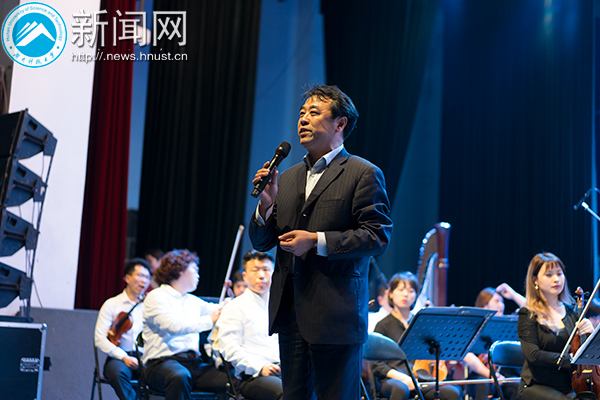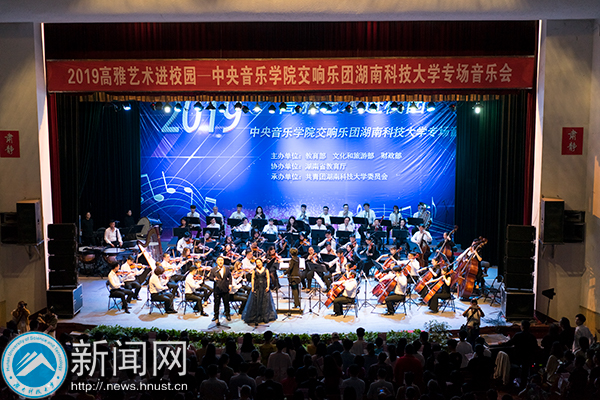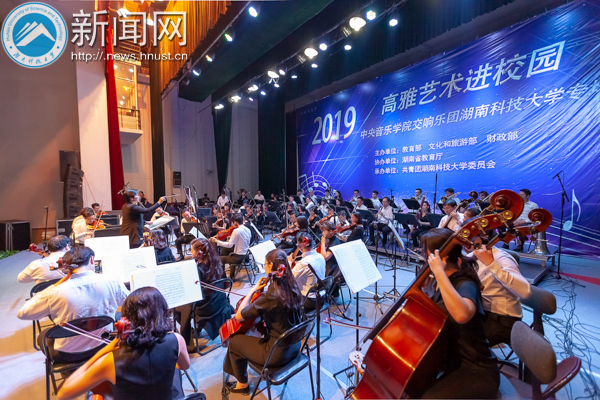On April 8th, “Introducing Classic Art into Campus 2019—the Special Concert for HNUST”, jointly hosted by the Ministry of Education, the Ministry of Culture and Tourism, the Ministry of Finance, co-organized by the Education Department of Hunan and undertaken by HNUST, was performed in the club by the symphony orchestra from Central Conservatory of Music (hereinafter referred to as CCOM). Zhao Ruilin, a member of the Standing Committee of the CPC Committee and Director of the Orchestral Instruments Department of CCOM, Hu Shiqi, Liu Youjin and Li Lin, Vice Presidents of HNUST, Jin Biao, head of Education Department of Physical, Health and Arts Education, and Liu Dawei, Secretary-General of the Committee of Art and Education, were at the concert. Besides, representatives of faculties and students from each school attended the concert. The concert brought all the audience under one roof to enjoy the music feast together.
Vice President Hu, on behalf of HNUST, extended his warm welcome to the symphony orchestra from CCOM. He noted that with the overall objectives of setting high moral standards and cultivating people, educating and influencing them with beauty, “Introducing Classic Art into Campus” was aimed at all-round growth and success of students through the promotion of excellent culture and arts of Chinese nation, as well as the creative transformation and development of traditional culture. Moreover, he hoped that the musical accomplishment and campus culture could be further improved through this concert.
At the very beginning, a piece of Beethoven’s Ode to Joy, the masterpiece after the great musician’s deafness, engaged the audience into fascination. The conductor Lai Jiajing, slowly swung her baton towards the cellists, then melodious notes streamed steadily. While she turned around and raised her hands, the melodies of violins and violas were gradually integrating, thus the whole temperament was higher with it. (Later the joining of violins and violas, by the instruction of Lai, brought the temperament to the ceiling.) Continued with the performance, solo periods once again presented the audience with an audio-visual feast of western instruments. When the piece ended, it received a warm ovation.
With powerful hands waving forward and bright eyes full of conviction, soprano Qin Kanru’s performance The Flame of Revenge Burns in My Heart created by Mozart, showed the positive energy of “Mayella Variations”. Tenor Li Jiaxuan performed a song If the Reason is Being an Emperor in a coloratura way, and his high-pitched voice won cheers from the audience. They subsequently brought a duet A Drinking Song by William Butler Yeats, delighting the audience in the song’s light waltz melody.
“I was so impressed by the soprano's exquisite coloratura, the tenor's precise pronunciation, and their chorus goes from a slow start then to an impassioned climax”, said Chen Huimin, a student from the School of Literature.
Later, Ode to the Red Flag combined the melody of Oriental Red and the rhythm of International Song led the audience into the revolutionary era of our forefathers. Chen Wenwei, a retired teacher's family member, brought her parents to this music ceremony. "Listening to the Ode to the Red Flag reminded me of the great era and Chairman Mao.” She also said, “Nowadays all of us are probably fickle, while the concert can give us a peace of mind.”
News links:
The Central Conservatory of Music Symphony Orchestra, composed of excellent musicians at home and abroad, is an international and professional team. And the orchestra has been always actively responding to the call of “Introducing Classic Art into Campus” and the guidelines of “entering into art, feeling the classics, cultivating sentiment and improving inner mind” of the Communist Party of China and the State Council. Up to now, it has performed many excellent classics in many universities in China, which has been well received by the public.
(Translated by Liu Xin, Hu Pan)


